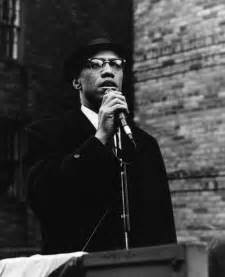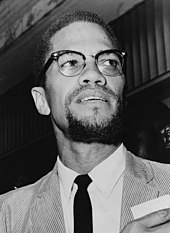Malcolm X: Popular Civil Rights Firebrand
One of the most familiar faces of the American Civil Rights movement, Malcolm X lived a life of constant struggle against long odds and was killed at an early age. 
He was born Malcolm Little in Omaha, Nebraska, on May 19, 1925, to Earl and Louise Little, who eventually had eight children. The Littles were followers of Marcus Garvey, one of the leaders of the Civil Rights movement who was known for his preference for Black Nationalism. The Littles became targets of hate groups, including the Ku Klux Klan, and moved to Milwaukee and then to Lansing, Mich. The move to Michigan did not stop the race-based attacks. The new attackers were members of the Black Legion, a splinter group of the KKK. In 1929, a white mob set fire to the Littles' house, and the fire crew stood and watched as the house burned to the ground. Death threats to the family continued after this. In 1931, when Malcolm was 8, his father was found dead on a set of streetcar tracks. Earl's injuries suggested to many people that he was a victim of violence, but the police ruled the death an accident and the insurance company with which Earl had taken out a policy ruled his death a suicide, meaning that his family would get little of the benefit listed in the policy. Louise Little suffered a mental breakdown in 1937 and was confined to an institution, where she stayed for 26 years. Her children were separated and placed in foster homes. The following year, Malcolm was told to leave school and report to a juvenile detention home in Mason, Mich. He attended Mason High School, got good grades, and was elected class president. In 1939, to a question from his English teacher as to his career intentions, Malcolm responded that he wanted to be a lawyer. The teacher told Malcolm not to waste his time on something that was never going to happen. (African-American lawyers at the time were few and far between.) Despondent, Malcolm eventually left school altogether and went to Boston to live with his older half-sister, Ella Little-Collins. Ella found Malcolm a job shining shoes, and Malcolm then got a job on the Boston–New York Yankee Clipper train. In Boston and later in New York, he discovered a life of crime and drugs and was eventually arrested and put in jail. He began his prison term in 1946, when he was 21. His sentence, on charges of larceny, was 10 years. He read voraciously while he was incarcerated. He also was visited by several of his siblings who had joined the Nation of Islam, a group that largely believed in the need for African-Americans to form their own separate state, apart from white Americans. Malcolm studied the group in detail and joined them in 1952. He changed his last name to X, saying that he considered Little a "slave name." 
Malcolm got out of jail early and settled in Detroit, where he worked directly with Nation of Islam leader Elijah Muhammad. Malcolm proved a strong worker and a magnetic presence at public functions. He set up mosques in Connecticut, Georgia, Massachusetts, Michigan, and New York. In just eight years, he increased the Nation of Islam membership from 500 to 30,000. One of the more famous people that Malcolm inspired to join the Nation of Islam was famed boxer Cassius Clay, who became Muhammad Ali. Malcolm met Betty Sanders in 1955 after one of his public lectures. She joined the Nation of Islam the following year and changed her name to Betty X. They dated for nearly three years and married in 1958. They eventually had six children, all daughters: Attallah was born in 1958, Qubilah in 1960, Ilyasah in 1964, and Gamilah in 1964; the last two were born a year later. The Nation of Islam's message resonated with a great many people. Malcolm was fond of saying things like, "A man who stands for nothing will fall for anything." The message especially resonated when it was given by Malcolm. A prolific writer and gifted speaker, he found himself becoming more popular than Muhammad himself. Malcolm did not shy away from espousing the view that violent means might be needed in order to achieve the goal of furthering the interests of African-Americans. At one point, he said this: "You don't have a peaceful revolution. You don't have a turn-the-cheek revolution. There's no such thing as a nonviolent revolution." His willingness to consider violence as a means of achieving the ultimate goal ("by any means necessary") stood in stark contrast to the nonviolence preferred by Martin Luther King, Jr. and others in the Southern Christian Leadership Conference. In particular, Malcolm derided the famed 1963 March on Washington, during which King delivered his I Have a Dream speech, as a waste of time. President John F. Kennedy was assassinated in 1963. Malcolm said publicly that Kennedy's killing might have been a case of "chickens coming home to roost"; the reaction to this statement was very negative, especially from his friend and mentor, Nation of Islam leader Elijah Muhammad. In that same year, Malcolm was shattered to learn that Muhammad, had done things that Malcolm considered unforgivable. Malcolm left the Nation of Islam and left the country, traveling through the Middle East and North Africa. He pledged his life to traditional Islam, made a pilgrimage to Mecca, and attended the sacred Hajj. He also changed his name to El-Hajj Malik El-Shabazz. 
His time overseas and his conversion to traditional Islam gave Malcolm a more peaceful, hopeful outlook for the future. Not long after he returned, he said that he thought that America could "actually have a bloodless revolution." In June 1964, he founded the Organization of Afro-American Unity. Despite this change in outlook, he still found himself a marked man, as had been the case before he left. The home that he shared with his wife, Betty, and their daughters was firebombed on Feb. 14, 1965. A week later, at a Manhattan ballroom rally of his organization, Malcolm was shot and killed, by three members of the Nation of Islam. He was 39. Later that year, Betty gave birth to twin daughters, Malikah and Malaak. Malcolm X is remembered most for the provocative things that he said, the way in which his words and his personality moved people to action, and for the things that he wrote, including his best-selling autobiography. |
|
Social Studies for Kids
copyright 2002–2026
David White





